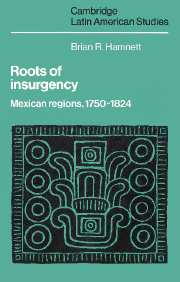Book contents
- Frontmatter
- Contents
- List of maps
- Acknowledgements
- Weights and measures
- Map 1 The viceroyalty of New Spain in 1810
- Introduction
- 1 Social tensions in the provinces
- 2 Insurgency — characteristics and responses
- 3 Conflict, protest and rebellion
- 4 Dearth and dislocation
- 5 Insurrection — recruitment and extension
- 6 The struggle for Puebla,1811–13
- 7 Local conflict and provincial chieftains
- 8 Conclusion
- Notes
- Bibliography
- Index
- CAMBRIDGE LATIN AMERICAN STUDIES
3 - Conflict, protest and rebellion
Published online by Cambridge University Press: 20 October 2009
- Frontmatter
- Contents
- List of maps
- Acknowledgements
- Weights and measures
- Map 1 The viceroyalty of New Spain in 1810
- Introduction
- 1 Social tensions in the provinces
- 2 Insurgency — characteristics and responses
- 3 Conflict, protest and rebellion
- 4 Dearth and dislocation
- 5 Insurrection — recruitment and extension
- 6 The struggle for Puebla,1811–13
- 7 Local conflict and provincial chieftains
- 8 Conclusion
- Notes
- Bibliography
- Index
- CAMBRIDGE LATIN AMERICAN STUDIES
Summary
Localised rebellions of limited duration were not infrequent occurrences in the colonial and early national periods. Most such occurrences stemmed from administrative abuses, fiscal impositions, altered labour practices, violated customary rights, or injured religious sentiment. In predominantly rural communities, the demands of the agricultural cycle alone restricted the possible duration of these types of rebellion. Many of them, in any case, were little more than extended demonstrations or protests. In Spanish America, the infrequency of large-scale revolt generally resulted from the colonial system's apparent capacity to absorb grievances, to provide some prospect of legal redress, and above all to ensure the survival of peasant communities that often derived from the pre-Columbian era. In regions distant from the central administrative core of New Spain, geographical remoteness often contributed to this survival. Paul Friedrich, for instance, has drawn attention to the survival of Tarascan lands in central Michoacán, where “the ruling castes of mestizos and Spaniards were mostly content to collect taxes from the local caciques and village elders without interfering in other matters”. William Taylor's examination of peasant society in Oaxaca reveals a very substantial survival of indigenous landownership.
While documentary evidence shows readily enough the sources of local tension, the causes of rebellions are difficult to uncover. The former did not inevitably lead to the latter. The search for the roots of insurrection leads in many directions. Yet, wherever we look, further causes appear, and the complexity and diversity of motivation multiplies. Rebellion could result from exploitation of local grievances by ambitious power-seekers, or from power struggles among local personalities.
- Type
- Chapter
- Information
- Roots of InsurgencyMexican Regions, 1750–1824, pp. 74 - 101Publisher: Cambridge University PressPrint publication year: 1986



